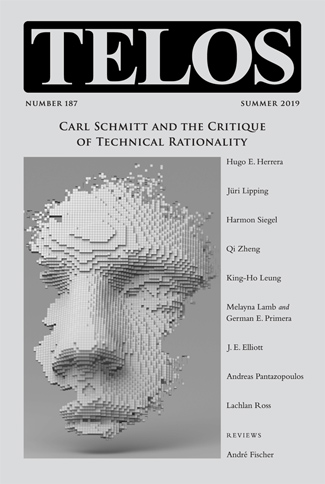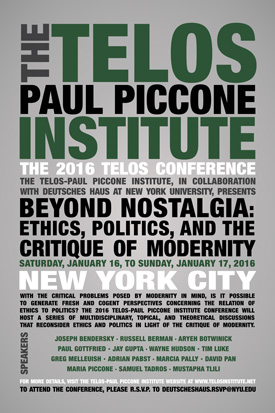Melayna Lamb and German E. Primera’s “Sovereignty between the Katechon and the Eschaton: Rethinking the Leviathan” appears in Telos 187 (Summer 2019). Read the full article at the Telos Online website, or purchase a print copy of the issue in our online store. Individual subscriptions to Telos are available in both print and online formats.
 This paper both rejects the reading of Thomas Hobbes’s Leviathan as a secularized katechon and rethinks anew the questions of sovereignty and politics in his thought. It does so by examining the eschatological character of his politico-theological understanding of the relation between the kingdom of the Leviathan and the kingdom of God. Indeed, through different contemporary readings of Hobbes’s theory of the state, this paper offers an insight into the concrete eschatology at operation in Hobbes’s thought and underscores its relevance for the understanding of government, biopolitics, and sovereignty. This is achieved through two different, albeit interconnected undertakings, which in turn allow us to agree but also to go beyond Giorgio Agamben’s claim that the state, in Hobbes, does not have a katechontic function. The first is an exposition of the a-teleological character of Hobbes’s eschatology and his metaphysics of motion. The second involves a consideration of the temporality and the nature of the relation between the ahistorical world of reason and the historical world of faith that underpins Hobbes’s theory of the state. Contrary to the contemporary interpretations in which Hobbes’s eschatology is presented as future regarding, we will highlight the chronological coincidence between the historical time of faith and the ahistorical time of the Leviathan, placing Hobbes within the political coordinates of Walter Benjamin’s messianism. By bringing this eschatological perspective to the fore, not only will the reading of Hobbes’s theory of sovereignty that aligns him with liberalism be problematized, but also an analysis of the resources that Hobbes offers to imagine a different form of politics will be developed. This paper both rejects the reading of Thomas Hobbes’s Leviathan as a secularized katechon and rethinks anew the questions of sovereignty and politics in his thought. It does so by examining the eschatological character of his politico-theological understanding of the relation between the kingdom of the Leviathan and the kingdom of God. Indeed, through different contemporary readings of Hobbes’s theory of the state, this paper offers an insight into the concrete eschatology at operation in Hobbes’s thought and underscores its relevance for the understanding of government, biopolitics, and sovereignty. This is achieved through two different, albeit interconnected undertakings, which in turn allow us to agree but also to go beyond Giorgio Agamben’s claim that the state, in Hobbes, does not have a katechontic function. The first is an exposition of the a-teleological character of Hobbes’s eschatology and his metaphysics of motion. The second involves a consideration of the temporality and the nature of the relation between the ahistorical world of reason and the historical world of faith that underpins Hobbes’s theory of the state. Contrary to the contemporary interpretations in which Hobbes’s eschatology is presented as future regarding, we will highlight the chronological coincidence between the historical time of faith and the ahistorical time of the Leviathan, placing Hobbes within the political coordinates of Walter Benjamin’s messianism. By bringing this eschatological perspective to the fore, not only will the reading of Hobbes’s theory of sovereignty that aligns him with liberalism be problematized, but also an analysis of the resources that Hobbes offers to imagine a different form of politics will be developed.
Continue reading →
By Telos Press · Friday, November 18, 2016 “The populace consists of individuals and free men, while the state is made up of numbers. When the state dominates, killing becomes abstract. Servitude began with the shepherds; in the river valleys it attained perfection with canals and dikes. Its model was the slavery in mines and mills. Since then, the ruses for concealing chains have been refined.”
—Ernst Jünger, Eumeswil
Continue reading →
By Telos Press · Wednesday, August 24, 2016 “The populace consists of individuals and free men, while the state is made up of numbers. When the state dominates, killing becomes abstract. Servitude began with the shepherds; in the river valleys it attained perfection with canals and dikes. Its model was the slavery in mines and mills. Since then, the ruses for concealing chains have been refined.”
—Ernst Jünger, Eumeswil
Continue reading →
By Flaminia Incecchi · Tuesday, June 7, 2016 In “On the Political: Schmitt contra Schmitt,” Benjamin Arditi is occupied with the task of revitalizing Carl Schmitt, to open or retrace various interpretative paths that allow us to use Schmitt in trajectories that he did not envisage or did not pursue. Arditi takes his reader by the hand into an exploration of a series of issues arising from Schmitt’s theory: disputes regarding the bellicose nature of the political, the identification of politics in the political, the charge of formalism, and the normative dimension of order.
Continue reading →
By Russell A. Berman · Monday, March 28, 2016 Traveling in Paris, Judith Butler published a “letter” dated November 14, in English on the Verso blog and in French in Libération, the day after the ISIS attacks, entitled “Mourning becomes the Law.” The short text treats two phenomena and argues for a connection between them: the process of mourning the victims of the attacks and the expansion of counter-terrorist practices by the state. Butler’s thesis is that the shared grieving of the dead served exclusively as a vehicle to justify amplified police powers: in this sense, mourning becomes the law, or at least law enforcement. A close look at her claims, however, shows significant deficiencies in the account of mourning and an important misreading of the Parisian response.
Continue reading →
By Maja Sidzinska · Thursday, January 28, 2016 The following paper was presented at the 2016 Telos Conference, held on January 16–17, 2016, in New York City. For additional details about the conference, please visit the Telos-Paul Piccone Institute website.
 Introduction Introduction
State institutions, starting with the entity we call “the state” all the way down to city DMV offices, seem no longer capable of acting or behaving ethically, regardless of what type of ethics we prefer to apply to politics—consequentialist, deontological, virtue, or any other—or whether we prefer liberal or communitarian normative agendas. Two features of modern political institutions block their intended functioning, ethical or not, and lead to new ethical crises. Those features are too-large size and incoherence. Thus even when policies[1] are ethical, institutions’ failures to implement or follow them undermine an ethical politics. And when various policies are implemented unevenly, new ethical problems arise. At least a partial antidote to these problems may be found in libertarian municipalism, the social-ecological approach articulated by Murray Bookchin, that demands small scale and direct democracy.
Continue reading →
|
|
 This paper both rejects the reading of Thomas Hobbes’s Leviathan as a secularized katechon and rethinks anew the questions of sovereignty and politics in his thought. It does so by examining the eschatological character of his politico-theological understanding of the relation between the kingdom of the Leviathan and the kingdom of God. Indeed, through different contemporary readings of Hobbes’s theory of the state, this paper offers an insight into the concrete eschatology at operation in Hobbes’s thought and underscores its relevance for the understanding of government, biopolitics, and sovereignty. This is achieved through two different, albeit interconnected undertakings, which in turn allow us to agree but also to go beyond Giorgio Agamben’s claim that the state, in Hobbes, does not have a katechontic function. The first is an exposition of the a-teleological character of Hobbes’s eschatology and his metaphysics of motion. The second involves a consideration of the temporality and the nature of the relation between the ahistorical world of reason and the historical world of faith that underpins Hobbes’s theory of the state. Contrary to the contemporary interpretations in which Hobbes’s eschatology is presented as future regarding, we will highlight the chronological coincidence between the historical time of faith and the ahistorical time of the Leviathan, placing Hobbes within the political coordinates of Walter Benjamin’s messianism. By bringing this eschatological perspective to the fore, not only will the reading of Hobbes’s theory of sovereignty that aligns him with liberalism be problematized, but also an analysis of the resources that Hobbes offers to imagine a different form of politics will be developed.
This paper both rejects the reading of Thomas Hobbes’s Leviathan as a secularized katechon and rethinks anew the questions of sovereignty and politics in his thought. It does so by examining the eschatological character of his politico-theological understanding of the relation between the kingdom of the Leviathan and the kingdom of God. Indeed, through different contemporary readings of Hobbes’s theory of the state, this paper offers an insight into the concrete eschatology at operation in Hobbes’s thought and underscores its relevance for the understanding of government, biopolitics, and sovereignty. This is achieved through two different, albeit interconnected undertakings, which in turn allow us to agree but also to go beyond Giorgio Agamben’s claim that the state, in Hobbes, does not have a katechontic function. The first is an exposition of the a-teleological character of Hobbes’s eschatology and his metaphysics of motion. The second involves a consideration of the temporality and the nature of the relation between the ahistorical world of reason and the historical world of faith that underpins Hobbes’s theory of the state. Contrary to the contemporary interpretations in which Hobbes’s eschatology is presented as future regarding, we will highlight the chronological coincidence between the historical time of faith and the ahistorical time of the Leviathan, placing Hobbes within the political coordinates of Walter Benjamin’s messianism. By bringing this eschatological perspective to the fore, not only will the reading of Hobbes’s theory of sovereignty that aligns him with liberalism be problematized, but also an analysis of the resources that Hobbes offers to imagine a different form of politics will be developed.  Introduction
Introduction 






